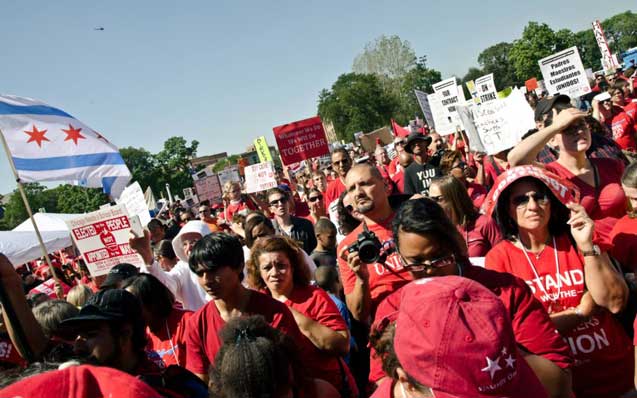
Did you know that Truthout is a nonprofit and independently funded by readers like you? If you value what we do, please support our work with a donation.
The battle between Mayor Rahm Emanuel and the Chicago Teachers Union (CTU) escalated sharply Sunday evening when only hours after the Chicago Teachers Union House of Delegates voted to continue the strike, Emanuel announced that he would be seeking an injunction against the strike. But come Monday morning, the judge said that he would prefer to schedule a hearing on the injunction for Wednesday or Thursday – after the union delegates meet again to discuss the contract on Tuesday.
The threat of an injunction came after the CTU House of Delegates voted to continue striking until Tuesday to give members time to consider the 180-plus pages of the tentative agreement on offer from Chicago Public Schools (CPS).
“This attempt to thwart our democratic process is consistent with Mayor Emanuel’s bullying behavior toward public school education,” said the CTU statement.
This brings the strike of around 30,000 public school teachers in the country’s third largest school district into its second week. The union is seeking to push through wage and evaluation demands along with what they say are desperately needed changes like air conditioner in schools, more counselors and support staff and a cap on class sizes.
CTU president Karen Lewis, speaking to reporters after the House of Delegates meeting Sunday that voted to continue the strike, said that there were several areas of concern to the delegates including teacher evaluations and recall benefits that led them to call for more time to see the contract. But the biggest problem for delegates and members, said Lewis, are the planned closings of more than 100 public schools in the next five years and the subsequent teacher displacement.
“It undergirds just about everything they talked about,” said Lewis about the delegate’s concerns.
The announcement comes after a flurry of media reports and assurances from the Mayor’s office Friday said that CPS and CTU were near to reaching a deal. But Lewis said that allowing members time to read the contract was part of running a democratic union. “I’m not going to stand there and tell delegates this deal is the greatest thing since sliced bread. I’m not a marketer,” she said Sunday evening. “Our members can read, they can make their own decisions.”
After the announcement was made that the CTU would be striking at least two more days, Emanuel announced that he would “take every possible action” to get students back into the classroom. To do this a state court in Cook County would have to determine that a continuation of the strike was “a clear and present danger to the health or safety of the public.”
But according to the education magazine Catalyst, there’s also an onus placed on the employer:
But the law states that “an unfair labor practice or other evidence of lack of clean hands by the educational employer is a defense to such action.” The Chicago Teachers Union, likely looking to strengthen its hand, announced … that it had filed unfair labor practice charges against CPS with the Illinois Educational Labor Relations Board.
It’s a move that had been in the works since Aug. 30, when the CTU House of Delegates set a Sept. 10 strike date. “(The delegates) determined they were striking both over the contract, and over the unfair labor practices,” CTU attorney Robert Bloch says.
The charges stem from the fact that CPS did not pay teachers step increases this year, implemented a new teacher evaluation system, and stopped the practice of sick-day payouts—all of which were illegal, the CTU argues, without negotiating them in a new contract. The union is also charging that CPS “is refusing to arbitrate grievances (and) give the Union relevant information, and has intimidated teachers who engaged in informational picketing at James Monroe Elementary School.”
Kevin Hugh, one of the delegates, said that a clear majority had chosen to continue the strike and take time to read the contract despite the risks.
“I think everybody wants to be back in the classroom, but I think everyone is nervous about a bad contract,” said Hugh. “In the end I think it’s wise for members to have a day to review the contract.”
Trump is silencing political dissent. We appeal for your support.
Progressive nonprofits are the latest target caught in Trump’s crosshairs. With the aim of eliminating political opposition, Trump and his sycophants are working to curb government funding, constrain private foundations, and even cut tax-exempt status from organizations he dislikes.
We’re concerned, because Truthout is not immune to such bad-faith attacks.
We can only resist Trump’s attacks by cultivating a strong base of support. The right-wing mediasphere is funded comfortably by billionaire owners and venture capitalist philanthropists. At Truthout, we have you.
Truthout has launched a fundraiser to raise $38,000 in the next 6 days. Please take a meaningful action in the fight against authoritarianism: make a one-time or monthly donation to Truthout. If you have the means, please dig deep.